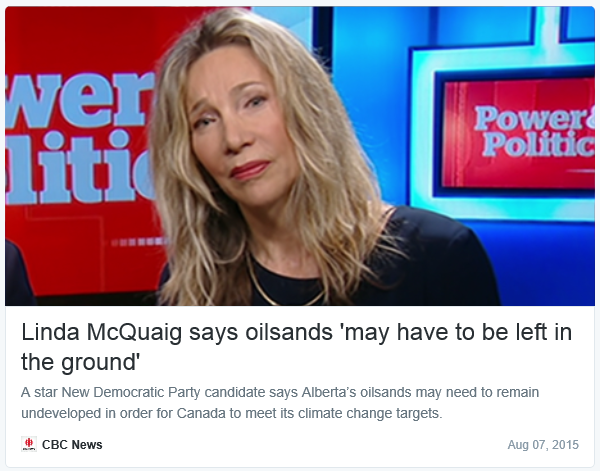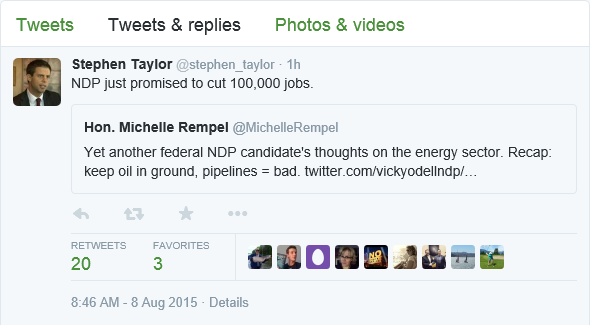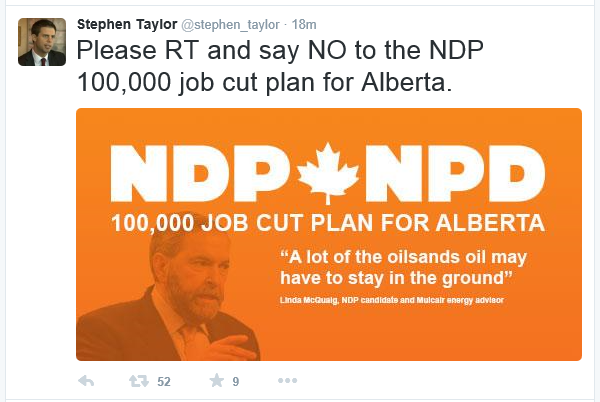Why am I going to hate this election (and you should too)? It’s not the falsehoods, the equivocation, or even the lies. It is the willful and purposeful denial of any kind of objective reality.
There was a blip of faux outrage last week when a prominent NDP candidate in Toronto suggested that the secret NDP plan was to shut down Canada’s oil industry (the sarcasm there is mine). In the Conservative social media echo chamber, this is how it played out:
Now compare this faux outrage to the actual quote:
“A lot of the oil sands oil may have to stay in the ground if we’re going to meet our climate change targets”
This is about as innocuous a statement as can be made about the future of the Bituminous Sands and their impact on Canada’s greenhouse gas targets. Nothing in that quote is the least bit controversial, except perhaps to the small number of people who still think Anthropogenic Climate change is a hoax.
Our current government, under Prime Minister Stephen Harper, has committed to reducing our greenhouse gasses, meeting internationally-agreed-upon reduction targets by 2030, and to transitioning to a carbon free economy by the end of the Century. Those are the stated aspirational goals of the Canadian government, announced by the Current Prime Minister back in June. These targets exist, and every party running in this election wants to meet or exceed those targets.
Similarly, there can be no dispute that the complete extraction of all 168 Billion barrels of proven reserves from the Bituminous Sands of the Alberta Basin will result in greenhouse gas emissions that would not allow us to meet those targets – the ones set by the current government of Stephen Harper. If we take them out of the ground, those oil reserves will represent all of our countries’ GHG emissions in 20 years, where currently, oil and gas only represent about 25% of our total emissions. So if we want to extract all of the oil and gas and meet our targets, we will need to do none of the other stuff… no cars, no agriculture, no aircraft, no cement plants or burning coal or heating our buildings. If we wish to keep doing those things, and if we plan to meet our GHG targets, then, sorry, folks, some of the bitumen is going to have to stay in the bituminous sands. It is simple math.
Back to that quote, though. Note the statement “A lot of the oil sands oil may have to stay in the ground if we’re going to meet our climate change targets” is not a policy statement, it isn’t an aspirational goal or a controversial idea – it is a simple statement of mathematics. How can this be controversial?
If there is a controversy to be found here, it is in the fact that no-one from the current government (or, for the most part, the opposition parties) has yet made this math explicit to their supporters: the plans of this government are fundamentally at odds with the stated goals of this government, once you take the time to do a little math. Perhaps the controversy here should be that she equivocated by saying “may” instead of “must”, and “if” instead of “when”.
After watching the interview, it was clear that the concept was goaded out of the NDP candidate by the Conservative on the panel by placing a quote from arch-conservative former Alberta Premier Peter Lougheed into her mouth in an attempt to re-direct the discussion from the topic at hand (that the Prime Minister had shifted his position on the existence of a recession). When confronted with the math, the Conservative somehow thought admitting that math to industry sends the wrong message, she suggests we should somehow “stand up for the energy sector” in the face of this math.
Which, I presume, means lying about the math. To the Industry, to the Canadian public, to your voting base, to pretty much anyone who will listen.
But when the social media took over, this was somehow a reckless “policy” that was going to cost Canada 100,000 jobs, a number either pulled out of someone’s arse, or (more likely) an appeal to Ontario voters who still remember the “100,000 Job Cut” quote from the disastrous Tim Hudak Conservative campaign in that province (which circles us back to here, ugh).
The entire meme is as idiotic as it is predictable. Instead of having a discussion about what our international commitments mean to Canada, instead of talking about what those commitments mean to our employment prospects, instead of discussing the multitude of other jobs that could be created by investing in the climate change solutions instead of doubling down on the cause of the problem, we have this stupid meme where people are raging about how admitting the math of the problem is Bad for Bidness.
Fortunately, since the “story” broke, a few sources have called out the math-denying tactics of the Conservatives here, but not enough. This raises the question of how our discourse degraded to the point where stating a simple scientific fact, even one littered with weasel words like “may” and “if”, really so controversial? Is it any wonder that message control is so tight in this new era? And what does that mean for representative democracy?
So as much as I want you to pay attention and get informed this election, I don’t want that topic to dominate this blog site, so after this post, you will (probably) not read much about the Federal Election here. If you really want to hear my updated and ongoing opinions on this topic (Hi Mom!), go over to my Facebook Page, where I will be counting down the days to the election, with a thought of the day. Or, you know, buy me a beer and ask me.



